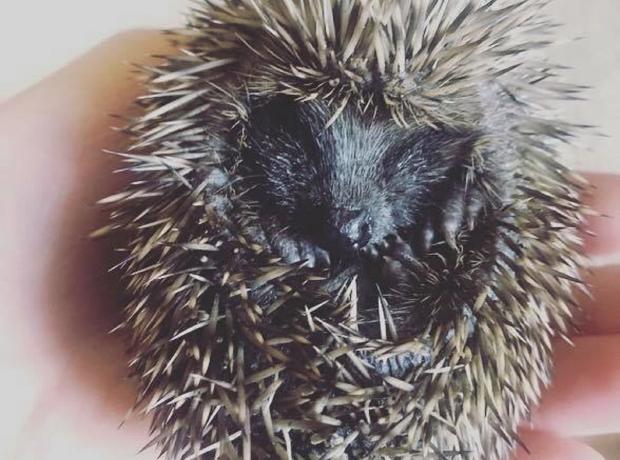Links to vets in Guernsey
Local useful links
Website donated by:

You normally see Hoglets in May, June or July, when the first litters are generally born, and in August-September, when the second litters are often born, although we do see them throughout the year when the weather is mild.
The last few weeks have been extremely busy not only with abandoned baby hedgehogs or hoglets as they are called being found but also some of the injured hedgehogs giving birth at the GSPCA.
Pictured are Corey, Roxy B and Georgie who are being fostered by GSPCA staff member Beckie Bailey and Seb Goman GSPCA staff member has Pebo and Willow in her care, both of which you can see at tonight’s Harbour Carnival trying to fly as Puffins.
The babies need around the clock care and we are appealing for your support to help the 100 hedgehogs and hogelts in our care.
To donate to the care of the hoglets or many other animals in our care please visit - www.paypal.me/DonateGSPCA
The average size of a litter is four to five, and they appear after about a 4 1/2 week pregnancy.
The reasons why you may find them can be if the mother is disturbed soon after the birth, as she may desert her hoglets. Many more hoglets are made orphans because their mother is killed or injured by motor vehicles, dies because of garden or farmland hazards, falls into a douit without an escape ramp or is poisoned by pesticides.
If you have a nest in your garden please do not keep looking in it as this may cause the mother to desert the babies.
The hoglets are often in or near their nest, which often will be under a shed, in a hedgerow, pile of garden debris or a compost heap. You may hear their distressed, shrill, bird-like piping. If you find one or two, the area should be searched, as there may be others, either still in the nest or nearby.
If you find abandoned hoglets they are very vulnerable creatures and are often found in a poor state. For survival, human help is needed quickly, and generally three things are needed urgently – WARMTH, TOILETING and FOOD.
The first being warmth can be as simple as holding them in your hands or wrapping in a piece of dry clothing.
Wild animals suffer stress in an unnatural environment and hedgehogs are no exception. Noise levels can be very stressful so please keep levels as low as possible.
The hoglets will benefit greatly by being kept warm and dry and will need to be in a quiet, calm atmosphere and handled only when necessary.
They should be placed in a small cardboard box or similar container, lined with plenty of newspaper. For bedding use some old (but not threadbare) towels. Place a hot water bottle, filled with hot – not boiling water - wrapped in a towel or warm material, in the bottom of the box (a reptile heat mat or heated propagator may be used instead). Put the hoglets on this and cover with further bedding.
The best option then for their survival is to transport them to the GSPCA in St Andrews or call us to collect them on 01481 257261 as soon as possible.
At the Animal Shelter we have intensive care units, trained team members and specialist milk.
Steve Byrne GSPCA Manager said “We are extremely busy at the GSPCA and currently have many baby hoglets in our care, some rescued and some been born at the GSPCA.”
“We have also seen many hedgehogs being injured b strimmer’s and hedge cutters in the last few weeks.”
“If anyone finds any hedgehog in need please do give us a call on 257261, bring it in to the GSPCA or check out our helpful links online.”
Beckie Bailey GSPCA Animal care Assistant said “The baby hoglets are keeping us very busy with all their feeds.”
“I am hand rearing Corey who was found in St Martins and Roxy B and Georgie which are all doing well.”
Seb Goman GSPCA Animal Care Assistant said “I absolutely love hand rearing hoglets.”
“My two lovely hand rear baby hogs are called Pebo and Willow.”
“Hopefully they will get big and strong so they can be released back to the.”
Steve continued “There are many ways to support the hoglets and injured hedgehogs in our care from donating to becoming an Angel Pen Pal Sponsor.”
“We are always looking for volunteers to help care for the hedgehogs and animals at the GSPCA with the next induction on the 2nd July at 630pm.”
For more advice on what to do if you find an injured hedgehog or wildlife in need please click here http://www.gspca.org.gg/animals/wildlife-advice
If you would like to donate the Esbilac Milk to the Shelter that we feed to the hoglets and other hand rears then please click here to see our Amazon Wish List https://www.amazon.co.uk/hz/wishlist/ls/25MJPPDAGXHL1?type=WishList
To donate to the care of the hoglets or many other animals in our care please visit - www.paypal.me/DonateGSPCA
For more information please email admin@gspca.org.gg or call 257261 for more details to get involved.
To become an Angel Pen Pal Sponsor to sponsor the hoglets and support our work please visit - http://www.gspca.org.gg/about/angel-sponsorship-scheme-animals-needing-guernseys-everlasting-love
To see our main Wish List on our website please visit - http://www.gspca.org.gg/about/our-plans-wish-list
For other fund raising ideas and ways to support please visit - http://www.gspca.org.gg/fundraising
To find out how your business could help us at the GSPCA http://www.gspca.org.gg/about/how-your-business-can-help-gspca-corporate-sponsorship
Our next Volunteer Induction Evening is on Monday 2nd July and for details http://www.gspca.org.gg/about/volunteers
To find out about our Going, Going, Gone Wild conservation project, Memorial Garden & Poison Garden projects with St Andrews Floral Group please visit - http://gspca.org.gg/page/st-andrews-floral-group-conservation-work-gspca



Post new comment